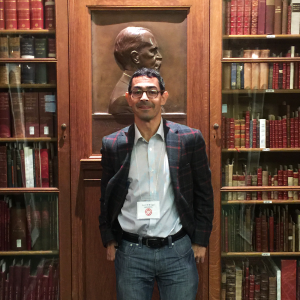Takeaway
Asking good questions is fundamental for learning about our patients. Five great questions, assembled by University of Virginia President James Ryan, can help you to connect with, understand, and serve patients better.

Lifelong learning in clinical excellence | November 14, 2018 | 2 min read
By Scott Wright, MD, Johns Hopkins Medicine
James Ryan, now President of University of Virginia, delivered a memorable speech to the graduating class of Harvard’s School of Education when he was the Dean there in 2016. In his talk, he shared five questions that can serve as a helpful framework for our communications and relationships.
While not conceived as a guide for healthcare professionals to use with patients, I have found them practical and valuable for allowing me to better serve my patients.
Question 1. Wait, what?
This question reminds me to slow down, and can facilitate a fuller understanding of my patients; this is absolutely necessary before making any judgment.
Example that I’ve used recently: “So you’re saying that you add sugar to your Frosted Mini-Wheats. Wait, what?”
Question 2. I wonder …?
This question, often followed by ‘why’ or ‘if’, ensures that the healthcare provider is staying curious, engaged, and fully present.
Example that I’ve used recently: “I wonder why your sessions with the physical therapist are not having an impact on your back pain or flexibility?”
Question 3. Couldn’t we at least…?
This question, usually followed by ‘agree’ or ‘get started’ can be viewed as a way to get unstuck when you and your patient are not seeing eye to eye about something.
Example that I’ve used recently: “While I know that you have just reminded me that you are not willing to pursue screening tests, like colonoscopy, couldn’t we at least agree that getting a flu shot in hopes of keeping you well and preventing illness is worth pursuing today?”
Question 4. How can I help?
This question is to be asked from a place of genuine humility – recognizing that the patient is truly the expert in their own life and may have the critical insight about what needs to happen next.
Example that I used recently when learning that my patient had been non-compliant with all five of his medications since his last visit: “How can I help you?”
Question 5. What truly matters?
We often ask this of our patients when there is a major health event impacting prognosis or life expectancy – such as at the time of diagnosis of a serious (mortal) illness. This question is in fact at the heart of all goals of care conversations. Ryan suggests that we’d all be better off if we don’t reserve this one just for momentous occasions, and that it can be useful to pose this query more regularly (to ourselves and our patients).
At the conclusion of his comments, Ryan offered a bonus question, not for others but instead to be asked of ourselves. It comes from and is the opening line in Raymond Carver’s poem entitled “Late Fragment”:
“And did you get from this life what you wanted, even so?”
Related to our work as healthcare professionals, it might be modified to:
“And did you get from this career what you wanted, even so?”
The “even so” is there to capture the reality that frustration is inevitable and ubiquitous, but also the hope that a career in medicine, even so, offers the promise of fulfillment and the possibility for joy.

